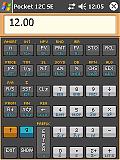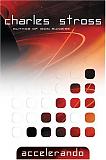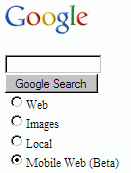Mon June 20 2005
 Cory Doctorow's third novel for download Cory Doctorow's third novel for download
|
|
02:04 PM by Colin Dunstan in E-Book General | Deals and Resources (No...
Interestingly, under the new Creative Commons Developing Nations License, this e-book lets anyone living in a country that's not on the World Bank's list of high-income countries treat the book as if it were in the public domain. |
|
[ 1 reply ] |
 Lygea HP-calc emulators now VGA-aware Lygea HP-calc emulators now VGA-aware
|
|
01:35 PM by Colin Dunstan in Archive | Handhelds and Smartphones
|
|
[ 0 replies ] |
Sun June 19 2005
Fri June 17 2005
 PalmSource Exclusive [Part 5]: Michael Mace (CCO) and John Cook (Dir Prd Mktg) PalmSource Exclusive [Part 5]: Michael Mace (CCO) and John Cook (Dir Prd Mktg)
|
|
06:03 PM by Bob Russell in Archive | Handhelds and Smartphones
The interview is being presented on MobileRead this week as a five-part series, and it continues today with the fifth and final installment, covering device stability, note taking on a PDA, and the PalmSource culture. MobileRead: How is PalmSource helping to create more stable devices for the future? Do you have any programs to certify compatibility with third-party apps? Michael Mace: Well, yes. In order to use the logo you have to pass the compatibility test. That is not the Good Housekeeping seal of approval because you can't test all 25,000 applications. It's physically impossible. If you try, you drive the cost of devices so high that nobody would be able to afford them. But there is a basic compatibility test that all the licensees have to pass. John Cook: You might have noticed that there are a couple of sessions that started on Monday, where developers can come in and get PalmOS certification so they can get more up to speed and grounding too. MR: I've seen you have sessions on testing, you have partners with test tools, and with PalmOS on Linux you have things like better memory protection coming in. One of the things that a lot of users are concerned about now is that with the increased complexity of these devices, they tend to crash or they wipe out flash ROM internally or externally. I think that's been a key advantage of Palm in the past, and I think people are looking to see whether or not it's going to be in future. MM: We'll do our best. You know as these devices get more complex, there are more ways for them to crash. That's inevitable. All the more reason why it's good to backup the user's data every time you sync the device. [We laugh a bit here at the much too easy opportunity to be reminded of this PalmOS advantage!] JC: The other thing that we are doing is we'll see more support for NAND, which in the typical problem scenario is that because you don't back it up all the time, you want to be able to keep that information. How you manage that efficiency is very important and it's one of the key technologies we need to do to build better phones. MR: With regard to persistent memory, it’s interesting that you see that a lot of people make off the cuff comments about how PalmOS is just now catching up to Pocket PC, yet you see that the announcements about Windows Mobile 5 include things like how persistent memory is now going to be supported. Speaking of things being supported, one of the things that I would love to use a PDA for is note taking, with just handwriting. MM: Me too. JC: Did you pay him to ask you that question?! It's one of [Michael Mace's] favorite subjects... MR: It's horrible trying to write notes on a pda now. I know that there may not be the technology right now to do that. But is there any hope that a pda will replace a small notepad? MM: I think there's hope, but you need a licensee that wants to do that. The problem is that companies have tried this and failed too many times, so they're very reluctant to try it. It's something we talk about, and we'd love to see somebody do it. I'd love to see a mobile device that's about this size [indicating with his hands a device about twice the size of a typical pda], and which can be used for note taking. I'll give you a piece of my own personal religion on it, though. I think that the right app is not text recognition because it doesn't work. It has to work virtually perfectly or you end up spending more time correcting it than you do actually doing stuff. And I've tried to use a Tablet PC because I carry around one of these things [paper pads] all the time, and said "Oh cool" Tablet PC... I'm going to replace this. I don't want to take notes on paper. I want to have it electronically; I want to be able to recall them, etc etc. But I found myself not being able to take notes the way that I would on paper, because I was focused on managing the device as opposed to just taking notes. So the right way to do it is not to try to do all the splines and smoothing and all the other computationally intensive stuff which, by the way, slows down the device, which causes there to be a very little lag so you start feeling like you're now pushing the cursor around on the screen instead of actually using ink. It should just be captured as ink. The reason we didn't do it in the past was because it required a lot of storage because you're storing bitmaps. We have hard drives now; we can store a ton of bitmaps. Just store it as a bitmap. I can read my own writing. The computer doesn't have to read it. And I'd love to be able to say I was in a meeting five years ago with you, let me call up my notes and see what we talked about, and I can get an image of my notes. What you can do is character recognition in the background against the bitmap. The thing is that if you are using that just to build an index, even if it's only 50% successful, you're still going to get a very good index. It's just that you won't be able to read the text. If there were VC money available to start hardware companies, I'd probably go do it myself. But there isn't. You know I can design the device for you today. It's got to be about $399. Tablet PC is too expensive, way too big, and it's not going to get down to that price point. It is a note taking appliance; it is not a shrunk down PC. Someday, somebody will do it. MR: Tell me a little something about the PalmSource culture, what it's like working at the headquarters there, what's the most unusual hobby somebody has in the management? MM: It's a pretty normal place for Silicon Valley. There's a ping pong table which is nice, and there's a foosball table. Our building is across the street from Frye's. That's kind of neat. What happens is every evening as I'm leaving work I'm thinking "I could go over there. I'm sure there's something I need over there. A cable, a keyboard or some reason to go in there!" But it's a pretty typical Silicon culture. Relaxed, casual, people in cubes throwing things at each other. JC: It's an interesting company, particularly on the development side, in that we effectively do product development 24 hours a day because we have an operation in France which is mostly, 99%, engineers. A couple token marketing people over there. And then in Nanjing, because of the China MobileSoft operation we bought there. Between those three teams we're constantly moving code around. I just saw something on a project I'm working on now. It had come in from Nanjing, they were looking at it in Sunnyvale today and then it's going off to Montpellier [France] so they could work on it over the Memorial Day weekend. That makes it an interesting dynamic. MM: That's a really good point John. If I'm looking in from the outside, one of the most interesting things that we're doing right now other than, obviously, getting into the wireless market, is trying to bridge Chinese culture, French culture and American culture. And there are very few companies that have done that. Especially on the basis of equals. There's three development sites and each has its own strengths. It's not like one dominant one giving orders to the others. It's going to be a very interesting ongoing process. We've done a whole bunch of cultural training already, how to work with the Chinese culture. They're getting training on how to deal with these insane Americans. So that's very interesting. We're truly a global company. MR: I want to thank you so much for meeting with me today. MM/JC: Glad to do it. Thank you very much for your interest! ---- Previous portions of this interview are available here… |
|
[ 1 reply ] |
 Mobile Ministry Magazine Mobile Ministry Magazine
|
|
01:50 PM by Bob Russell in Miscellaneous | Lounge One of the wonderful things about the mobile community is the wide diversity among us, together with a great unity as we share a common passion. For example, a very popular interest that's mentioned often is for sci-fi books. If you like sci-fi reading on mobile devices, you are in luck because there are some great sources of e-books out there, for both free and purchased e-books. If you do a little browsing in our forums you'll find a load of links and recommendations. Another common interest among many mobile device fans is the religion and the Bible, as well as writings about just about every faith. Of course, because of that, you'll see many applications devoted to the Bible, and other related programs. It may eventually even become commonplace to see scripture beign read on mobile devices in worship services. And, like for any other interest or hobby, there are many mainstream mobile device applications like todo apps, e-book readers, outliners, etc. that can be of great value to the individual or to a minister. Mobile Ministry Magazine is a very nice web site by one of our valued readers, Antoine RJ Wright, with information about these kinds of applications and about related topics such as Christian blogging. It's worth a look. Recently, he has been considering the interesting question "What If Paul Had A Blog?" You can check it out at: What If Paul Blogged? Part One |
|
[ 0 replies ] |
 Mark Cuban says to Macrovision, "Give Customers a Break" Mark Cuban says to Macrovision, "Give Customers a Break"
|
|
11:22 AM by Bob Russell in Archive | Portable Audio/Video Mark Cuban is probably best known for owning the Dallas Mavericks and being a co-founder of Broadcast.com. But he is also co-founder of HDNet, an all HDTV network. One might think that as a content owner, he would be another proponent of the strictest DRM protection possible. But, instead, he speaks as a welcome powerful voice for keeping the movie and recording industries in line with respect to DRM and copyright law. In his most recent blog entry, What Am I Missing Macrovision?, he takes a fresh look at the lawsuit that Macrovision filed against Sima and Interburn’s DVD Copying Products. (Those programs probably have functionality that is not a whole lot different than DVD Decrypter, an excellent program for personal DVD archiving and aid for mobile device content viewing, which has been "killed" by legal threats.) Basically Mark points out that all the publicity is just showing everyone that Macrovision protection is worthless, and that the mainstream pirates already have the ability to break the encryption and mass produce pirated copies. So what are they accomplishing other than making life miserable for the average paying consumer. Mark has a lot of $$'s "at risk" in content that could be pirated, but he hasn't lost his common sense just because he has a stake in the issue. He argues that Macrovision should give the customer a break. As a customer who has spent an enormous sum on content, I heartily agree. And Mark, we will not de-value your content with mass piracy. We appreciate your apporach. Keep making your point with a voice of reason, and may your unique philosophy lead to even more profits! (via BlogMaverick) |
|
[ 0 replies ] |
 "Accelerando" free e-book edition by Charles Stross "Accelerando" free e-book edition by Charles Stross
|
|
08:42 AM by Colin Dunstan in E-Book General | Deals and Resources (No...
You can download the e-book in various formats including HTML, RTF, Plucker, and Palm Doc. |
|
[ 2 replies ] |
 Google indexes the mobile web Google indexes the mobile web
|
|
08:06 AM by Colin Dunstan in Archive | Mobile Sites
If you host a mobile site you can try to submit it here. |
|
[ 1 reply ] |


 Cory Doctorow made available his third novel
Cory Doctorow made available his third novel  Lygea is known to deliever excellent Pocket PC emulators of the HP-12C Financial and HP-15C Scientific calculators. They work just like the real ones, only faster. Fully programmable and with hundreds of built-in functions. The
Lygea is known to deliever excellent Pocket PC emulators of the HP-12C Financial and HP-15C Scientific calculators. They work just like the real ones, only faster. Fully programmable and with hundreds of built-in functions. The  MobileRead.com is very pleased to complete the presentation of this exclusive interview with two of the key leaders at PalmSource… the Chief Competitive Officer, Michael Mace, and the Director of Product Marketing, John Cook, who were kind enough to sit down with me at the recent PalmSource Mobile Summit and DevCon 2005 in San Jose, CA to share their views on the direction and future of PalmOS.
MobileRead.com is very pleased to complete the presentation of this exclusive interview with two of the key leaders at PalmSource… the Chief Competitive Officer, Michael Mace, and the Director of Product Marketing, John Cook, who were kind enough to sit down with me at the recent PalmSource Mobile Summit and DevCon 2005 in San Jose, CA to share their views on the direction and future of PalmOS. Full-time SciFi writer Charles Stross made available for free and under a Creative Commons license the e-book edition of his latest novel
Full-time SciFi writer Charles Stross made available for free and under a Creative Commons license the e-book edition of his latest novel 
 Latest E-Books
Latest E-Books

